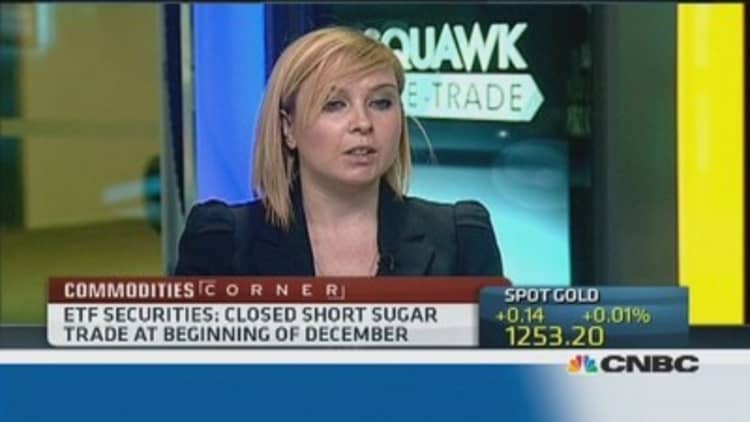The battle between sugar and high-fructose corn syrup (HFCS) has gone into the fifth (sixth?) inning. Which will win is anybody's guess.
The two sides have been in court for three years, suing each other for false advertising.
The Western Sugar Cooperative filed the first lawsuit in 2011, accusing the Corn Refiners Association (CRA) and backers such as Cargill and Archer Daniels Midland of misleading the public with an educational campaign promoting HFCS as nutritionally identical to sugar.
"Sugar is sugar," the association said back then, as it spent an estimated $50 million to promote HFCS. It even sought—unsuccessfully—to persuade the Food and Drug Administration to let it change the name of HFCS to "corn sugar."
The CRA countersued in 2012, claiming that the sugar industry was smearing HFCS in order to get consumers to buy products sweetened with sugar.
(Read more: Global food prices tick up on higher sugar costs)
Both agricultural industry groups benefit from taxpayer subsidies and protections. Corn is the most highly subsidized crop in the U.S., with the federal government paying an estimated $10 billion or more in various forms of aid between 2010 and 2012, according to the Environmental Working Group's database.
And while Congress cannot agree on a farm bill, it did agree to renew a controversial safety net for the sugar industry that inflates prices.

Lawyers for both sides are scheduled back in federal court Thursday. Specifically, they're arguing over discovery, but what may seem like a procedural ministop in this legal saga reveals how poisonous the atmosphere has become.
Soda sales in the U.S. total an estimated $76 billion a year. That's a lot of sugar water, and sugar would like to regain its crown as the sweetener of choice.
In court, lawyers for the Western Sugar Cooperative are asking a judge to force the CRA and its member companies to stop blacking out large swaths of documents considered confidential. They claim that documents that have been unredacted reveal that "defendants willfully deceived the public and press."
The sugar group accuses corn syrup manufacturers and lobbyists of masking millions of dollars in payments to scientists and others to promote the health and safety of HFCS even while questioning the validity of their claims.
(Read more: Peltz joins Mondelezboard, won't pursue Pepsi deal)
Evidence includes a series of emails, including two from ADM's head of external affairs, David Weintraub. In one, he warns the CRA that videos promoting HFCS as "natural" are "asking for trouble." In another, he suggests that efforts to change the name of HFCS to "corn sugar" could come across as "dishonest and sneaky."
There is also an email from the CRA about a pro-corn syrup campaign by Consumer Freedom, launched through a Washington public affairs firm hired by the association. "As you know, our sponsorship of this campaign remains confidential," it said.
Weintraub declined to comment to CNBC on the pending litigation.
Finally, a 2010 study by the University of Southern California inked HFCS to the rise of Type 2 diabetes. Shortly after, the CRA brainstormed with consultants about hiring a third party to conduct a similar study using a larger sample.
"If for any reason the results confirm USC, we can just bury the data," wrote Consumer Freedom's David Martosko, according to evidence submitted in the case.
Asked for comment, the CRA trade group referred CNBC to a press release focused on its claims that the U.S. sugar industry has conducted a "spin and smear conspiracy" against HFCS and its producers.
"The sugar industry, through its trade group, has knowingly deceived the public in an effort to frighten consumers away for sugar alternatives, particularly HFCS," the statement said.
(Read more: McDonald's global comparable sales decline)
The CRA claims that many of the disputed documents in discovery involve "sensitive and proprietary budget information."
The association accuses the Western Sugar Cooperative of "wildly" claiming that corn refiners are engaged "in a 'sinister conspiracy' to hide information important to public health and safety—while never articulating exactly what health information is supposedly being hidden from the public. There is none."
The CRA and its partners go on to accuse sugar producers of their own cloak-and-dagger practices, saying, "If anything, it is the Plaintiffs who have engaged in a spin-and-smear conspiracy to scare the public into consuming sugar over HFCS."
Still, even after all the mud-slinging between these two giants fighting to win Americans' sweet tooth, the CRA offered before the hearing to remove confidential designations from nearly all its discovery documents.
But that's got good enough for the sugar group, which wants the judge to force everything into the open unless the defense can successfully argue otherwise.
As for when an actual trial might begin, a pretrial conference isn't scheduled until November.
The legal bills are piling up, eventually to be added to any potential damages.
Adam Fox, lead attorney for the Western Sugar Cooperative, told CNBC that his side is seeking unspecified damages, "but we are talking potentially billions of dollars."
—By CNBC's Jane Wells; Follow her on Twitter: @janewells


